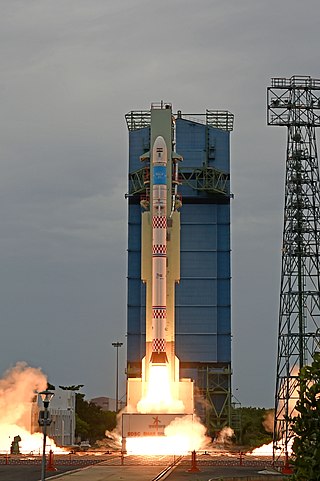
The Polar Satellite Launch Vehicle (PSLV) is an expendable medium-lift launch vehicle designed and operated by the Indian Space Research Organisation (ISRO). It was developed to allow India to launch its Indian Remote Sensing (IRS) satellites into Sun-synchronous orbits, a service that was, until the advent of the PSLV in 1993, only commercially available from Russia. PSLV can also launch small size satellites into Geostationary Transfer Orbit (GTO).
EnMAP is a German hyperspectral satellite mission to provide high accuracy hyperspectral image data of the Earth surface on a timely and frequent basis.
Spaceflight Industries, Inc. is an American private aerospace company based out of Herndon, Virginia, that specializes in geospatial intelligence services. It sold its satellite rideshare business, Spaceflight, Inc., in June 2020.

Planet Labs PBC is a publicly trading American Earth imaging company based in San Francisco, California. Their goal is to image the entirety of the Earth daily to monitor changes and pinpoint trends.
Satellogic is a company specializing in Earth-observation satellites, founded in 2010 by Emiliano Kargieman and Gerardo Richarte.
NanoAvionics Corp is a small satellite bus manufacturer and mission integrator founded as a spin-off from Vilnius University, Lithuania in 2014.

Firefly Alpha is a two-stage orbital expendable launch vehicle developed by the American company Firefly Aerospace to compete in the commercial small satellite launch market. Alpha is intended to provide launch options for both full vehicle and rideshare customers.
GSAT-20 is a communication satellite jointly being developed by Indian Space Research Organisation Satellite Centre and Liquid Propulsion Systems Centre and will be launched by a SpaceX Falcon 9. The GSAT-20 satellite is funded, owned and operated by New Space India Limited. The entire capacity onboard CMS-02 satellite will be leased to Dish TV. GSAT-20 will be a continuation of GSAT series of communication satellites. The satellite is intended to add data transmission capacity to the communication infrastructure required by Smart Cities Mission of India.

Capella Space is an American space company with satellite and declassified SAR data solutions for government and commercial use. It offers space-based radar Earth observation satellites equipped with synthetic-aperture radar that can collect imagery through clouds and at night. The company is based in San Francisco, California with offices in Washington, D.C., and Louisville, Colorado. It was founded by Payam Banazadeh, a former engineer at Jet Propulsion Laboratory of NASA, and William Walter Woods.
ICEYE Ltd. is a Finnish microsatellite manufacturer. ICEYE was founded in 2014 as a spin-off of Aalto University's University Radio Technology Department, and is based in Espoo.

The Small Satellite Launch Vehicle (SSLV) is a small-lift launch vehicle developed by ISRO with payload capacity to deliver 500 kg (1,100 lb) to low Earth orbit or 300 kg (660 lb) to Sun-synchronous orbit for launching small satellites, with the capability to support multiple orbital drop-offs. SSLV is made keeping low cost, low turnaround time in mind with launch-on-demand flexibility under minimal infrastructure requirements.
Bellatrix Aerospace is an Indian private aerospace manufacturer and small satellite manufacturing company, headquartered in Bangalore, Karnataka. The company was established in 2015 and in June 2022, the company raised $8 million in a Series A funding round to pursue the development of in-space propulsion systems.

NewSpace India Limited (NSIL) is a Public Sector Undertaking (PSU) of the Government of India and under Department of Space. NSIL is responsible for producing, assembling and integrating the launch vehicle with the help of industry consortium. It was established on 6 March 2019 under the administrative control of the Department of Space (DoS) and the Company Act 2013. The main objective of NSIL is to scale up private sector participation in Indian space programmes.
Satellize is the first private Indian company to have a satellite in space. In December 2018, their first satellite was launched into space via SpaceX. They launched their second satellite, AISAT for a customer, AMSAT India on board the fourth stage of the PSLV-C45.
Swarm Technologies, Inc. is a company building a low Earth orbit satellite constellation for communications with Internet of things (IoT) devices using a store and forward design. Social Capital partners Jay Zaveri and Arjun Sethi incubated and seed funded Swarm, Craft Ventures was an early investor. On 16 July 2021 Swarm entered into an agreement to become a wholly owned subsidiary of SpaceX.

The PSLV-C51 is the 53rd mission of the Indian Polar Satellite Launch Vehicle (PSLV) program. The Polar Satellite Launch Vehicle (PSLV)-C51 was launched at 04:54 (UTC) / 10:24 (IST) on 28 February 2021 with the main payload from Brazil, INPE's Amazônia-1 and 18 other ride-sharing small satellites.

India's Space Industry is predominantly driven by the national Indian Space Research Organisation (ISRO). The industry includes over 500 private suppliers and other various bodies of the Department of Space in all commercial, research and arbitrary regards. There are relatively few independent private agencies, though they have been gaining an increased role since the start of the 21st century. In 2023, the space industry of India accounted for $9 billion or 2%-3% of the global space industry and employed more than 45,000 people.

The PSLV-C53 is the 55th mission of the Polar Satellite Launch Vehicle (PSLV) and 15th mission using PSLV-Core Alone variant. PSLV-C53 is the second dedicated commercial mission of NSIL.









